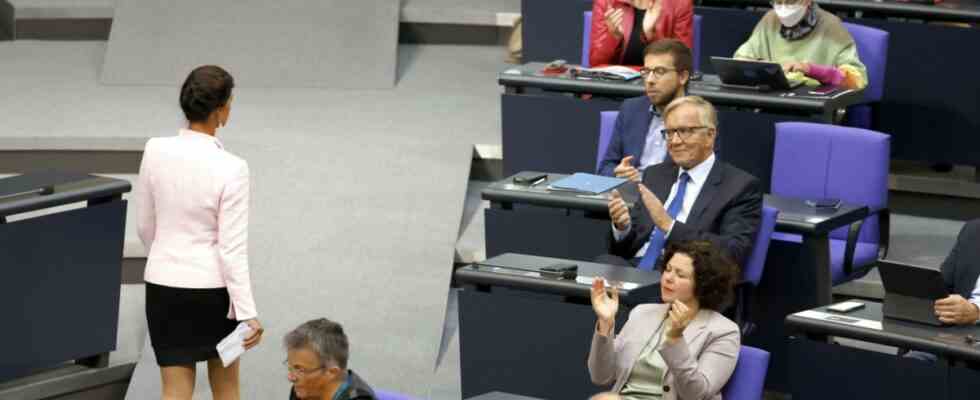When Ulrich Schneider joined Die Linke in 2016, he announced that the party “without a doubt” stands for a policy of fair compensation. As chief executive of the Paritätischer Wohlfahrtsverband, he was accused of having violated the required neutrality. At least that should now have been superfluous. The social lobbyist Schneider is now at best lobbying for those leftists who are increasingly despairing of their own shop. On Monday evening he announced his departure from the party.
The fact that the left faction let Sahra Wagenknecht on the podium last Thursday in the Bundestag and what she then “launched” was too much, Schneider wrote on Twitter. Garnished with the remark: “You should have known.”
Almost everyone knows that the former parliamentary group leader Wagenknecht has been leading a kind of inner-party opposition movement in the left for some time. Most people will probably have noticed that she takes a position on questions of economic sanctions against Russia in particular and dealing with Vladimir Putin in general that diametrically contradicts her party’s decisions. Why was Sahra Wagenknecht the only left speaker on economic and energy policy during the budget week of the Bundestag? This is a mystery that will probably keep the party busy for a long time. At least it triggered the acute crumbling symptoms.
Many reactions from the party to Schneider’s departure now have a similar tenor: very unfortunate, but understandable. Caren Lay, member of the Bundestag, said in this context: “The decision to let Wagenknecht speak was the most fatal of many wrong decisions, it’s killing me.”
“Like a feudal courtier state”
Former federal manager Jörg Schindler is of the opinion that the left faction behaved “like an arrogant feudal courtier state”. The long-time North Rhine-Westphalian state chairman Knud Vöcking justified his resignation immediately after the Wagenknecht appearance with the words: “My patience is over.” Former member of the Bundestag Fabio de Masi also resigned from the party on Tuesday, but without explicitly referring to the Wagenknecht cause. His decision was not part of a wing dispute, de Masi wrote.
In her speech, which is already legendary, Wagenknecht described the traffic light coalition as “the stupidest government in Europe” and then said: “The biggest problem is your grandiose idea of starting an unprecedented economic war against our most important energy supplier.” What was meant was undoubtedly an economic war against Russia, broken by German fences.
At least some of the Left MPs present, who had been clapping politely until then, demonstratively stopped applauding at this point. Katharina Dröge, the leader of the Greens parliamentary group, said in her heckling what many on the left apparently thought: “Putin is happy about your speech, Ms. Wagenknecht!”
Dealing with Wagenknecht has occupied the left for years in an almost pathological way. For many comrades, however, the pain threshold seems to have finally been reached. Criticism within the party is not only aimed at the speaker herself, but increasingly also at the parliamentary group leaders Amira Mohamed Ali and Dietmar Bartsch. After all, they let Wagenknecht to the microphone.
Martina Renner, member of the Bundestag, signed an open letter calling for the resignation of Bartsch and Mohamed Ali. And Ulrich Schneider is said to have explicitly linked his exit from the party to the behavior of the group leader in an internal text message.
“No ban on speaking for Wagenknecht”
When asked by SZ, Dietmar Bartsch said: “Our task is to deal with the traffic light policy. So far, the group has not decided to ban Sahra Wagenknecht from speaking.”
But all sorts of rumors are now circulating as to how Wagenknecht made it onto the list of speakers in such a prominent position, even though she is not responsible for budgetary policy or energy issues. One of these theories says that this was the only way to prevent a Wagenknecht speech at the most recent Monday demonstration in Leipzig, which would probably have caused even more damage.
Leading leftists now consider a split in the party to be inevitable. The only question is when Wagenknecht will leave and with how many. If there were more than three MPs, the left would lose its parliamentary group status in the Bundestag. Incidentally, that would also be a means of pressure to make it onto almost every speech list.

